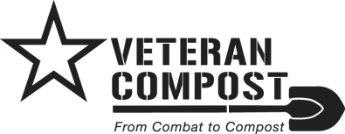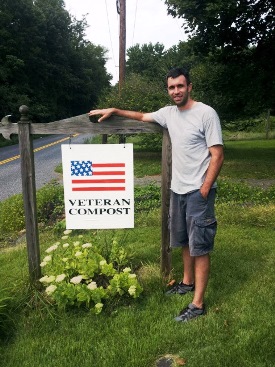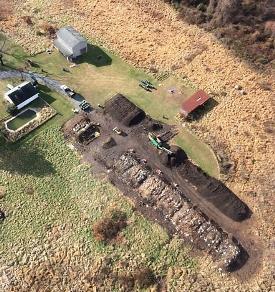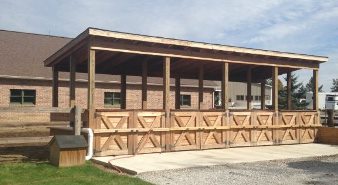|
 |
Newsletter
November 2014
|
|
 |
| |
|

|
|
Justen Garrity spent five years on active duty as a Combat Engineer Officer in the U.S. Army and five additional years in the National Guard. Following his 15-month deloyment to Iraq, Justen returned home to Pennsylvania in 2009 to the worst job market in decades and, despite his extensive military training and a Bachelor of Science degree in Management of Information Systems, he quickly found himself unemployed. And so, in 2010, Veteran Compost was born.
|

|
|
Following his return from Iraq, Justen took note of the need to better manage our resources, and he envisioned a compost business that processed organic wastes responsibly and in a way that benefited his local community.
However, the path to that point began much earlier. Growing up in Pennsylvania and Maryland, he was an active member of the Boy Scouts and he spent his time outdoors camping, hiking, and biking. It was through Scouting that Justen learned to appreciate nature and the need for conservation.
|
|

|
At first, Veteran Compost consisted of himself, an old farm truck, an even older farm tractor, and 30 acres of leased farmland in Aberdeen, Maryland. Justen visited nearly every compost facility between Virginia and New York to learn how the industry worked. Along the way, he met Ned Foley of Two Particular Acres in Royersford, Pennsylvania. Ned encouraged Justen to avoid the turned windrow method of composting, saying "I've made that mistake. There's no need for you to repeat it."
|
|
Instead, he suggested that Justen contact O2Compost to learn how to compost using an Aerated Static Pile System, which is what he did.
Along the way, Justen's business continued to grow as he brought on new accounts for raw feedstocks and finished compost. Toward the end of his second year, Justen decided that running his business was too much work for one person, so he hired a friend and fellow veteran to lend a hand. Then he hired another, and another. Today - 4 years later - Veteran Compost employs 12 veterans and their families. In fact, they will soon be opening up a second compost facility near Annapolis, Maryland, to serve the needs of the DC Beltway.
Veteran Compost is a model of sustainability. Justen's motto is "Keep it Local, Do it Right, and Produce the Best Compost Possible." To learn more, visit www.veterancompost.com.
When you do, please send Justen a note of thanks for his past and continued service to our country.
|
Compost Tea
A Concentrated Liquid Form of Beneficial Soil Microbes
by Peter Schmidt, partner of Compostwerks LLC
Compost tea is fast becoming a widely accepted soil management tool. It is a liquid representation of high quality compost which is applied to soil and foliar surfaces to help manage plant vigor, nutrition and beneficial microbe activity.
This concentrated liquid is brewed for approximately 24 hours in a compost tea brewer which supports a highly aerated, food-rich environment. To give you an idea of how concentrated this liquid is, 50 gallons of properly made compost tea is biologically equivalent to over one cubic yard of compost. The main advantage of liquid compost over solid compost is the ease of handling and the ability to apply highly beneficial soil biology over large areas.
In order to make high quality compost tea, you will need a specially designed sprayer and compost tea brewer. There are no viable 'out of the box' systems on the market, so some training in this area is usually necessary and highly beneficial. Please visit www.compostwerks.com for comprehensive information on equipment, materials, and support.
|
Peter's Rules of Composting - A 12-Part Series
Rule 7: There are No Decimal Points in Composting
Composting is not precise. Engineers love to calculate everything to the second or third decimal point, but with composting it's better to round up, round off, and round often.
Example 1: When we calculate the feedstock proportions for a compost mix using a Compost Calculator (as with the spreadsheet that has been included with the O2Compost Training Program), it might tell us to mix 2.85 parts of "this" with 4.36 parts of "that" and then add 23.75 gallons of water to get a mix with a C:N of 25:1, a bulk density of 675 pounds per cubic yard and a moisture content of 62.5%.
In reality, we would use this information as our basis to take about three buckets of "this" and add it to four heaping buckets of "that" and hose it down until it looks good and wet. The key is for the operator to know from experience whether the mix looks good or not. This is where the art of composting comes into play.
Example 2: Virtually all composting operations measure the volume of raw feedstocks and finished product in cubic yards. A cubic yard is equal to 27 cubic feet which is equal to 204 gallons.
A cubic yard of finished compost in the bin is about equivalent to 1.5 cubic yards in the back of a pickup truck when it's loaded out, and equivalent to about 1.2 cubic yards when that same truck gets to its destination. This is because the compost in the bin is consolidated under its own weight. It is fluffed up in the bed of the truck and it is somewhat re-compacted due to vibration on the ride home.
Example 3: If you insert a temperature probe in a compost pile and it reads 157.5°F and you then remove the probe, reinsert it an inch or two to the right, it could now read 152.0°F. Which temperature is correct?
The answer is - it doesn't matter which is right because both are well above our goal of achieving 131°F throughout the pile for at least three days. When monitoring pile temperature, we are looking for trends, not precision.
The First Corollary of Rule 7 - Learn to Trust the Law of Compensating Errors
Previous Rules:
Rule 1 - Start With the End in Mind (April Newsletter)
Rule 2 - To Learn to Compost, One Must Compost (June Newsletter)
Rule 3 - Every Question About Composting Has Only One Answer (July Newsletter)
Rule 4 - Oxygen is the Secret to Composting (August Newsletter)
Rule 5 - Water is the Highway of Life (September Newsletter)
Rule 6 - Composting Takes Time (October Newsletter)
|
A New Compost System Comes On-Line |
|

|
OWNER: Ronda H.
LOCATION: Fort Wayne, Indiana
10 horses on mini-flake pine bedding
The finished compost is spread back onto the pastures to "give back what has been taken out"
This system can also be found on our website (Chez Pine).
|
Coming Events
December 10-11, 2014
Aerated Static Pile Composting and Compost Tea Workshop
- St. John's University, New York City
Co-Hosted with Compostwerks
For more information, visit www.compostwerks.com/event-schedule/workshop-registration
or call (844) 266-9375
January 20-23, 2015
US Composting Council Conference
- Austin, Texas
Peter Moon will be covering "Advances in Small Scale On-Site Food Waste Composting"
For more information, visit compostingcouncil.org/compost2015/
|
|
Protecting Our Land, Air and Water Resources
|
|
O2Compost
Price-Moon Enterprises, Inc.
PO Box 1026
Snohomish, WA 98291
|
Phone: 360-568-8085
Email: info@o2compost.com
www.o2compost.com
|

|
|
